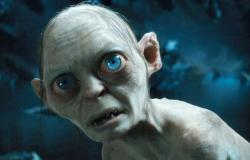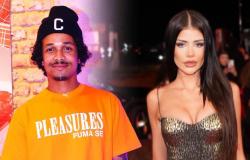“The new version is completely different in every way. Scenically, in terms of costumes and in what happens on stage,” Petr Gazdík describes the performance presented by the Brno Municipal Theatre. The interview took place even before its premiere.
Why are you bringing Bastard back to the stage exactly after thirty years?
We’ve often thought it would be nice if Bastard came back. We were his fans as students, so we kept talking about him and pitching this idea to his writers. One day it just came out, we had been talking about it for a really long time.
How do you relate to the original version of the production?
It was a beautiful time. I just finished my studies at the conservatory and started at JAMU, with which many of my various personal experiences are connected. And Bastard, he was something absolutely extraordinary at the time. We lived through it and with it.
In addition to Faust, the work is also inspired by biblical stories. What is his main message?
It is difficult to talk about any main message, it is mainly about solving the existential issues of man, his being in this world and the meaning of some overlap of our life. Should a person sometimes prefer to give way to something in order to behave correctly and do a certain good, or should he enjoy life to the fullest no matter what, in order to grab as much as possible for himself in that short period in terms of the existence of the world?
Do you think the text has acquired a new meaning after all these years? After all, times have changed.
I do not think so. Bastard is so timelessly written that it could be played in pretty much any era. Similar to the case with his model – Goethe’s Faust.
Did the director of the theater Stanislav Moša, together with Zdenek Merta co-creator of Bastard in 1993, leave the direction to you alone, or did he correct your work?
He didn’t talk to me at all. I was a little surprised that I should direct the production, because every time I offered the option of introducing Bastard, I thought that of course it would be directed by Stand. When I then asked him what idea he had, he told me to do “whatever I want”.
The cast also includes actors who participated in the initial version of Bastard. The main roles were played by Jan Apolenář and Satana Zora Jandová. Was the intention to also cast actors from the original line-up?
I thought that if they could still play some parts, it would be right for them to appear in the production. I am an actor myself and I know how important it is that not only the authors, but also those who serve to visualize their works, have a sense of a certain continuity.
You cast Dušan Vitázek in the title role. Were you looking for someone similar in type to Jan Apolenař, or did you want a completely different Bastard?
We were looking for someone more, and that’s what Zdeněk Merta wanted, with a similar voice to Jan Apolenář. However, this one is so specific that it was really difficult. I chose Dušan Vitázek because I have worked with him many times and know how he works. We understand each other in what we are talking about, and his nature is, I think, accurate for the role of Bastard, or he can understand the divisiveness of the given character. I could hardly imagine going through this search with anyone else.
Don’t you regret not playing in the musical yourself?
I always feel a little sorry for it – and the truth is, it beats inside me. But I always say that the actor is one color on the canvas of the picture, while the director puts the whole canvas together. And this option, at least for me, usually wins.
In addition to Zdenek Merta, his wife Zora Jandová and daughter Ester also play in the musical. How was your preparation with their family?
Esterka is a budding actress and she may have too much respect from me. Again, I have respect for her father – and of course for her mother as well. From the beginning, I tried to conceive the work in such a way that the gentlemen who wrote it and are, in a way, as I say, the founding fathers of the modern era of our theater, were not only not disappointed, but simply delighted. I consulted with Zdenek (Merta) and so far he is enthusiastic about the concept. Standa (Moša) will be surprised, and therefore I hope and believe that he will also be happy.
Are you afraid of his reaction?
I do not have. I would be more sorry if it was unpleasant to him, or even hurt him.
The musical imaginatively begins the celebrations of twenty years since the opening of the Music Stage. What else can viewers look forward to?
Above all, for our overall program, which the theater offers all the time, regardless of whether there are any celebrations or not. As part of the celebration, I think it could be a nice concert that we are preparing, a kind of gala of everything we have played in the past twenty years. The production of The Witches of Eastwick, which was very popular, is also returning – directed by Stanislav Moša.
Recently, you have returned other titles to the stage, for example Cyrano from Bergerac or My Fair Lady from Zelňák. Is it a safe bet, or could it be that a successful title years ago will now be a flop?
I don’t think these productions can be completely “flop”. Of course, not every thing someone does has to be good, but these titles already bring with them some obvious audience response and interest. And it would certainly be stupid to return something that did not entertain the audience before.
Children from the musical school at the Municipal Theater will participate in the Dokořán festival in June with their performances Whispering in the Wind and Musical Tempest. Have you already found future stars in it?
We found future stars in her, because the whole workshop started with the fact that we needed to come up with a preparation for the little actors from the musical Matilda. If you go to see Matilda today, you will find out that there really are real stars. How we managed to prepare them and how talented they are is completely unusual, although it seems almost normal today. That is the greatest success.
Are the children doing well at school?
We see a constant progression in the children who come to us, how they relax, dare to create something themselves and be creative. We try to prepare them in such an unobtrusive way. It’s not really a school, more like a workshop. But what pleases me the most is how much they like to go there and how big a group they have become.
You have a whole series of directors behind you. What have you “worked” the most so far?
I don’t even know… Actually, I probably always “overdo it”, because preparing everything so that I like it above all is a rather complicated, demanding and, above all, responsible job. As an actor, I don’t usually have stress, but as a director, I’m afraid if I’ve led the actors into the “wrong alley”, for example. I worry that if the audience doesn’t like it, they’ll be unhappy after they’ve sacrificed so much for it. However, I probably put the most effort into the production of Don Juan.
Which musical role suits you best so far?
It’s such an acting cliché that we can’t tell the difference. Maybe more if a role annoys us. But I was lucky in my life that I didn’t come across such a role and never had to do something that I really didn’t enjoy. My main role is probably Judas from Jesus Christ Superstar, because it made me, let’s say, European famous. I had the opportunity to play it in Vienna, in the important Theater an der Wien. Of course, then also Jean Valjean, who still accompanies me.
You come from an acting family, so you practically grew up in a theater environment. What do you remember most over the years?
I can’t say that I like it the most, actually I remember everything and all the time. Of course, my life in the theater had a lot to do with my mom, who left me last year, so the memories from my entire life until last year mainly belong to her.
Your children have also gone in the same direction. How do your roles as a parent and artistic mentor intersect?
I’m not a mentor by any means, so I only give advice when I see someone wants it or asks for it. I think my sons have a role model in me, and that is enough. I gave them a little advice on some things and I am very happy that they understood even the little I told them and are already working on it in different ways. Nowadays, they have the opportunity to look at YouTube, where they can find all possible styles and how different world singers or actors approach them. My sons then consult with me about it, but there is no way that I would teach them on a regular basis.
Are you strict with them?
I am, maybe too much. But for all your closest ones. I feel like they should know everything, know right away, read my thoughts before I speak them, and lead by example. So they have a pretty hard time with me… (Laughs)







